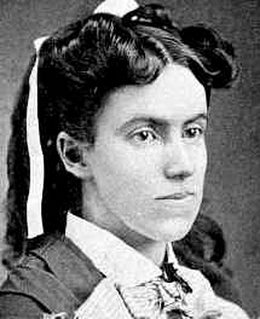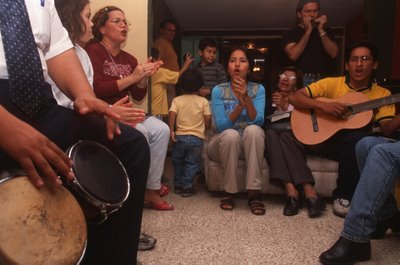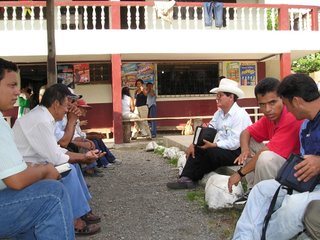In Luke 10, Jesus sets out clear, step-by-step instructions for the 70 disciples to obey in reaching out to
"every town and place where He was about to go." If Jesus himself trained, taught, and instructed his disciples in the way He knew would work, why 2000 years later, do we think we can improve upon His divine model?
Jesus instructed his disciples,
"PRAY to the Lord of the Harvest to send out workers into His harvest..." (10:2)
We have improved upon this instruction by, 1) substituting
'praying to the Lord of the Harvest' for TALKING about the need for praying, 2) forget about praying, what needs to be done is massive recruitment--get out there and do what has to be done to get people involved, mobilize the masses into training seminars at the largest convention centers in town and invite in the biggest names that will draw the crowds.
Jesus instructed his disciples,
"now GO, I'm sending you out like lambs among wolves..." (10:3)
We have improved upon Jesus' words by substituting His command to go for something much more convenient for us: COME! Come to our church...meeting...revival...youth group...evangelistic crusade...ladies brunch...sports event...spiritual emphasis...Bible study...etc. Going out to where the lost are and entering their world is always a lot messier than sitting around hoping and praying they will somehow come to us and whatever event we have planned for them. While I can give a couple of hours for an event at church, I certainly don't have the same couple of hours to go out of my way into the scary unknown. I might be seen associating myself with non-desirables in places not known as appropriate Christian hang-outs.
Jesus instructed his disciples,
"DON'T CARRY a money-bag, travelling bag, or sandals..." (10:4)
Since we have never really understood exactly what Jesus was trying to say with this obscure command, we have simply ignored it and done just the opposite. We believe it is not possible to do the Lord's work unless we have a large money bag, and having all the necessary implements in our travelling bag for the journey
(cars, land, building, salaries, literature, support packages, furnishings, sounds system, musical instruments, laptop, PowerPoint, video projector, etc.) And certainly let's not forget the importance of the having the latest fashion in sandals and attire and other necessary personal implements for the task. Afterall, we want to make a good impression on those we are trying to reach!
Jesus instructed his disciples,
"DON'T GREET ANYONE along the road..." (10:4)
Jesus obviously didn't understand the importance of greetings in our present day cultures. How is one ever to gain access into "their world" unless we spend a lot of time greeting and building relationships? So, once again we seek to improve (ignore) another outdated command of our Lord and actually spend enormous chunks of time and plan whole evangelistic strategies that never get beyond anything other than "greeting" and nurturing a few relationships. We do ladies teas, let's meet the neighbors, go to ball games together, find someone to drink coffee with, etc. While all these may be good activities, the problem is that we seldom move beyond the "greeting stage" to the remaining instructions of Christ as given in Luke 10:1-9. We tend to lose focus when we stop and greet folks unless we are in tune with the whole strategic process that Christ was teaching. Jesus knows how easily we are distracted, so He warns us upfront to not greet anyone, or do anything else that will distract us from the important mission we are on.
Jesus instructed his disciples,
"SAY 'PEACE to this household' and if a son of peace is there your peace will rest on him..." (10:5)
Modern consensus agrees that
'saying peace to this household' is a waste of time. The best way to win a community, town, or city is to get out there in vast numbers and knock on as many doors as possible. When they open the door, invite them to your church, and maybe even preach the Gospel and let them know this might be the very last chance they will ever have for salvation. If they refuse, leave them a Gospel tract, and a bunch of literature from your church and be sure to pray for them before leaving.
Jesus instructed his disciples,
"REMAIN IN THE SAME HOUSE, eating and drinking what they offer..." (10:7)
Remain in the same house? Just that one house? You've got to be kidding! The more houses you visit, the more contacts you will have, the greater the number of positive results. You wouldn't want to dare risk everything on just one household. There is a high chance things will not work out and then you will be left with nothing. Plus, what's the big deal with wasting time by eating and drinking with people? Does eating and drinking accomplish anything of eternal value? Don't think so...
Jesus instructed his disciples,
"EAT THE THINGS set before you..." (10:8)
It's like Jesus foreknew we would have trouble with understanding the importance of the eating/drinking part, so He said it TWICE to make sure we would get it. But the fact is we have yet to grasp the importance of eating and drinking with people BEFORE trying to proclaim the 'Good News" to them. What's important is getting down to business and sharing the Gospel with lost folks. We eat and drink with our fellow Christians, not with pagans!
Jesus instructed his disciples,
"HEAL THE SICK who are there..." (10:9)
Well this one is easy to ignore because we all know that only the Pentecostals and the Charismatics are the ones into the healing stuff. We certainly can side-step this sticky one. We wouldn't want to actually involve ourselves in any controversial issues like healing the sick (might lose our jobs over it!) After all, most of us are cessationists and no longer believe these extraordinary gifts of the Spirit are valid today. We have the Bible and that's all we need. So, basically we are off the hook on this one. Next...
Jesus instructed his disciples,
"TELL THEM, 'The kingdom of God has come near you..." (10:9)
Well FINALLY Jesus gets around to telling us to do what really matters--the 'main thing'-- which is declaring, preaching, teaching the Gospel message of the Kingdom to these lost people. Let's just cut to the chase and skip all the other stuff. It is time to get down to the important business of witnessing and sharing the Gospel. We are free to skip over the parts of Jesus instructions we don't like or understand. Wasn't his main thrust obviously this last point? We will certainly try to obey this part, but the rest is up for debate and interpretation--in other words, not much of importance in all those instructions preceding this final one.
Is it any wonder that after 2000 years we still haven't finished the task given us by Christ? We think we have a better way of doing things. We have the new, improved version, and yet continuously scratch our heads and wonder why things aren't working out the way they are supposed to?













